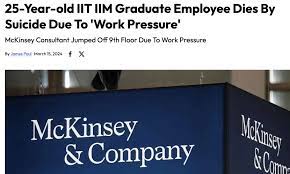Deadly “pressure-to-perform” claims another life
March 20, 2024 Leave a comment
A 25 year old with technical and business degrees from IIT and IIM, the top Indian colleges and working for McKinsey, the world’s best consulting company. Everyone would say what an amazing guy. The mental pressure around the two statements is in itself unimaginable.
It is generally accepted that at least 3 years of work experience is required to take up an advanced or Master’s degree and in the case of an advanced business degree more experience is preferred. Academic institutions should assess the work experience and the candidate’s exposure and knowledge of the business side of things before granting admission for business degrees. The guy came straight out of IIT at 22 years and landed at IIM. What exposure does someone at 22 have of business and the ones who have will definitely not take up a business degree, not at 22 for sure. Out of IIM and straight into McKinsey. It is nothing less than maniacal.
It is clearly not just the work pressure that drove him to take his life. The deadly “pressure-to-perform” comes from downstream a long way back. Suicides among students preparing for entrance exam to get into the IITs and among students studying at IITs have been rising alarmingly over the years. That is 5 years of academic mental stress with the added stress of cracking the CAT exam to get into the IIMs and then 2 years of even more academic stress during the MBA program. When he joined for work, he had already spent 7 years of his life in the pressure cooker of intense academic stress.
Work pressure and micromanagement are common in most companies now but would depend largely on the ones managing the projects. Companies like McKinsey hire the best graduates from the top colleges and then the pressure to perform and the toxicity in the work culture is thrust upon them. Now the question everyone would have asked is, why didn’t he just quit and move on rather than drown himself in the mire? Because of social and peer pressure. Can’t someone who has gone through the grind of JEE, IIT, CAT and IIM absorb work pressure and continue performing at his peak? No one would have understood, not even his family. The problem with peak performance is, no one can stay at the peak forever and down the peak could become a free fall very easily and quickly. He was way too young to manage work pressure, push back micromanagement and survive office politics and toxicity.
It took me 10 years and enough exposure of working with international clients to understand how a MBA can add value to my profile and MBA from an international college would be the best to prop up my international work experience. With age and experience comes maturity and the ability to work smarter and manage all kinds of stress. Consulting is no easy job and consulting with McKinsey means working with the top companies in the world. It is impossible for anyone to live in sustained mental stress for a long time and the younger one is the more vulnerable they are to capitulating sooner.
From the time I heard the Dire Straits classic “Private Investigations”, a narrative of the daily life of the not so scrupulous private investigators, two lines have stuck with me.
“What have you got, at the end of the day
What have you got, to take away”
What we will all eventually take with us is knowledge and experiences and not the names of academic institutions where we studied, the names of companies where we worked and the expectations of people around us. Our well being is something only we understand the best. The stress and suicides created by pressure to perform will stop when we realize these simple facts.





